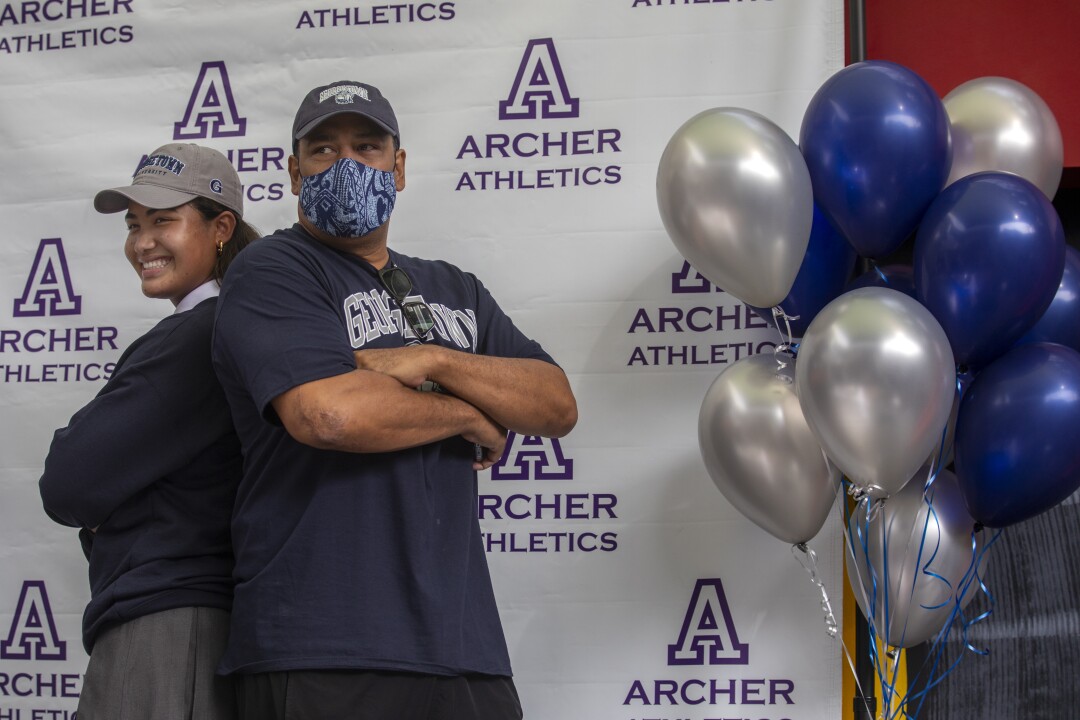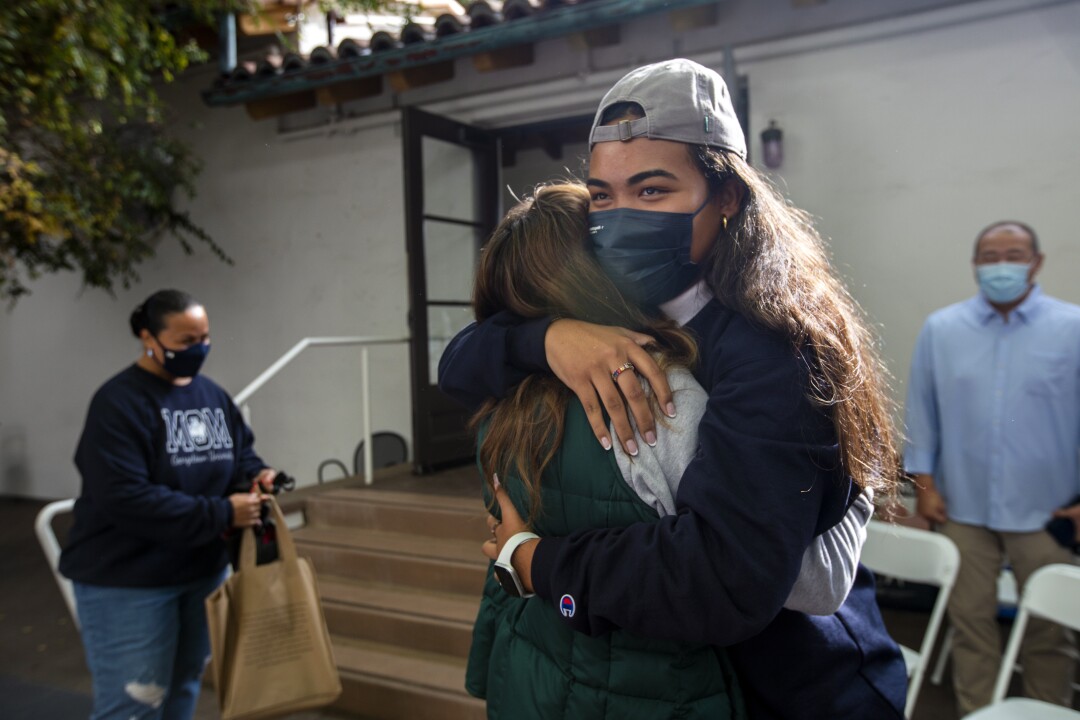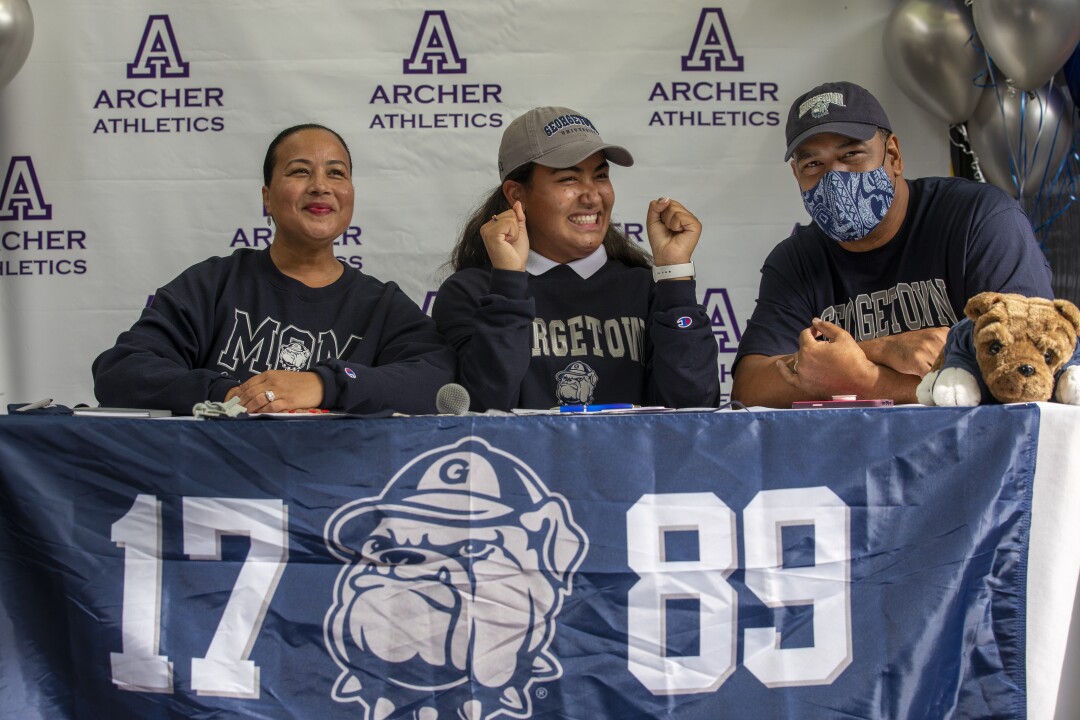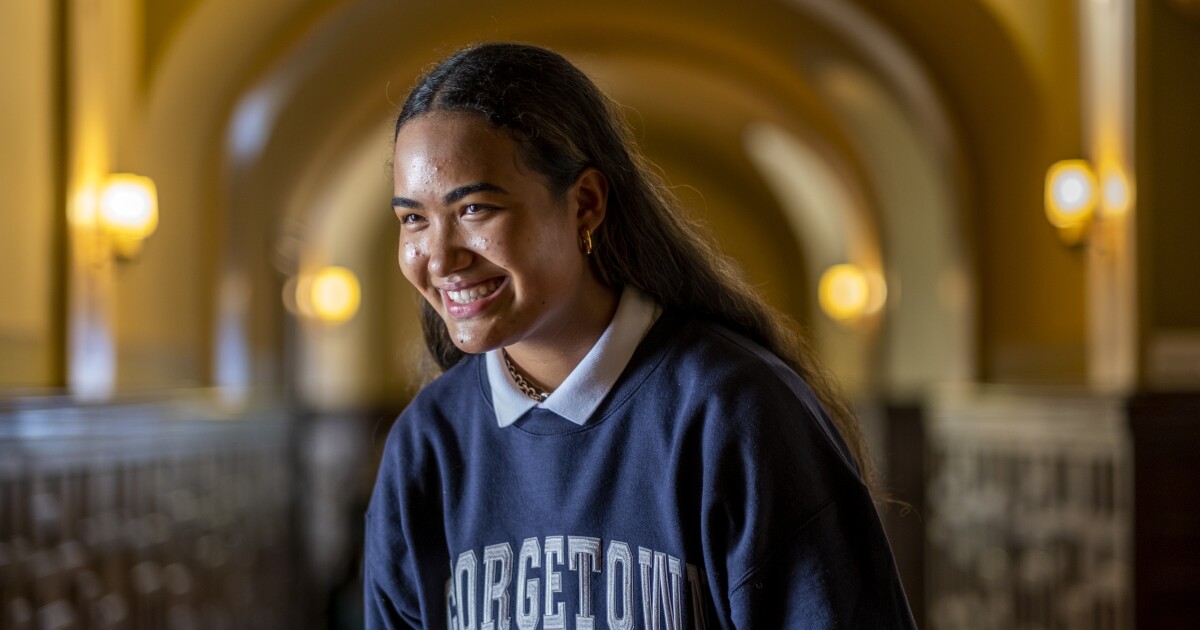Vaughan Anoa’i is a star on the volleyball court and in life
Vaughan Anoa’i didn’t want the money back.
At the start of the COVID-19 pandemic, her club team, Sunshine Volleyball, was issuing refunds to its players for no-longer-necessary travel expenses. Covering funds for plane tickets, hotels and meals, it was a hefty sum. Yet upon getting the news via email, Anoa’i called her coach, Cari Klein, telling her the club could keep the contribution to cover the cost of another player’s trip in the future.
Klein was stunned. Club volleyball is incredibly expensive, but for girls who are hoping to play in college, it’s necessary. Eventually, Anoa’i’s contribution helped pay for a teammate whose family had been hit hard by the pandemic, Klein said.
“She got to go on two trips because of Vaughan’s generosity,” Klein said. “It’s life-changing for these kids.”
Anoa’i, a senior at the Archer School for Girls who has committed to Georgetown, is staying in the life-changing business. She’s launching a charity initiative called Block Back, planning to donate $25 for every block she will total over the final two seasons of her club career. Anoa’i plans to donate about $6,000.
The money comes with a greater purpose. Volleyball, particularly on the club level, can be at times an exclusive party that members of underrepresented groups can’t get into. Anoa’i knows that — and, as a Samoan and African American woman, she wants more inclusivity.

Vaughan Anoa’i stands back-to-back with her father, Reno Anoa’i, during a letter-of-intent signing ceremony.
(Francine Orr / Los Angeles Times)
“It is such a predominantly white sport,” Anoa’i said. “In this initiative, me being the face of it in some ways — just making sure that I am serving as a role model just to enforce that girls of color, young women of color can play volleyball and they should feel comfortable and welcomed in that environment.”
::
The value of giving back is entrenched in Samoan culture. One particular tradition, Fa’alavelave, calls upon friends and family to contribute gifts or money to special events in a person’s life.
Anoa’i’s father, Reno, comes from a Samoan family tree famous for an abundance of wrestlers — such as Dwayne “The Rock” Johnson. Hepushed his daughter to be charitable, and she started volunteering with the Soup Kitchens at 8 years old. He’s now the chief executive officer at Knokx Pro Entertainment, a pro wrestling academy and promotion company he founded with fellow pro wrestler Rikishi in Van Nuys, not far from the family’s home in Studio City.
She’s proud of that heritage and those values; When she was younger, she’d boast to people that she had a hundred cousins, said her mother, Tiffany Smith-Anoa’i.
“She’s extremely proud — she is very involved in the culture, because the culture is all about giving and respect,” said Smith-Anoa’i, who is an executive vice president of diversity, inclusion and communications at ViacomCBS.
At the same time, people close to Anoa’i describe her as naturally generous. They say she’s been this way since she was young, protective of her friends and entrepreneurial.
“Her influence is pervasive,” said Kim Smith, the athletic director at the Archer School. “In every conversation she has, in every huddle she has.”

Vaughan Anoa’i receives a hug from a family friend at her letter-of-intent signing ceremony.
(Francine Orr / Los Angeles Times)
In the early months of the COVID-19 pandemic, as Anoa’i’s life slowed down, she took some time to reflect on both herself and the economic impact of the coronavirus. Block Back came out of a simple idea to connect one of her passions — volleyball — with a way to give back to the community.
Over the last couple of years, Anoa’i has been saving her allowance and birthday money with plans to eventually donate the $6,000 across four volleyball clubs: Starlings Volleyball USA, Long Beach Mizuno Volleyball Club, Actyve Volleyball Club and Sunshine Volleyball.
Klein praised “the maturity of her thinking ahead, for her to have that kind of maturity and thought process of, ‘Hey, this is going to affect people and girls in volleyball in a negative way, and let me see what I can do.’”
::
There’s only one way to play volleyball in college. Just one pipeline. Klein says the path to a Division 1 opportunity leads directly through club.
“Maybe there’s two girls a year in the country that don’t play club volleyball but somehow get a spot,” Klein said. “There’s only one way through this.”
But club is “expensive,” as Smith-Anoa’i stressed. Travel adds up — airfare, hotels, food. On top of that, facilities are hardly ever located in lower-income areas.

Vaughan Anoa’i, seated between mother Tiffany Smith-Anoa’i and father Reno Anoa’i, celebrates during her letter-of-intent signing ceremony.
(Francine Orr / Los Angeles Times)
That can lead to an erasure of underrepresented groups. According to the official Demographics Database, 70% of all NCAA college volleyball players are white, while 11% are Black.
That imbalance starts early, and Anoa’i has felt it firsthand, with trips to cities like Louisville, Ky., that she described as a “culture shock.”
“As a girl of color, she recognizes that she is sometimes the only one at certain tournaments,” Smith-Anoa’i said. “She says, ‘Inclusivity is very important to me, and I want to make sure that other girls see me doing it and me letting them know that I see them.’”
Anoa’i enlisted the help of a graphic designer to create a logo for Block Back, which displays the bold lettering “Vaughan’s Block Back” above purple flowers underneath two palms outstretched to block a volleyball. The image is not only an endorsement of the charity, but also an expression of Anoa’i’s identity — the flowers represent her Samoan heritage, while she specifically requested that the palms be darker in color.
“A lot of people who come from underrepresented backgrounds will use sports as a vehicle or a pipeline to college, and I think that’s why this is so important and so vital in this day and age,” Anoa’i said of the need for representation.
She hopes to be a beacon for inclusivity, both this season and beyond. Anoa’i wants to work against stereotypes in all areas — of athletes of color as “dumb jocks,” she said, and of Samoan athletes as just wrestlers or football players. She’ll pursue a dream of going to law school at Georgetown after completing her undergraduate degree and will be the first Samoan-African American women’s volleyball player in the program’s history.
In the meantime, each earth-shattering block she converts for Sunshine Volleyball in her final season will count a little extra. She hopes her initiative will send a message.
“I would want people to feel the desire and also feel the need to look inside of themselves,” Anoa’i said, “and recognize they have the power to create service or create change.”
For all the latest Sports News Click Here
For the latest news and updates, follow us on Google News.

